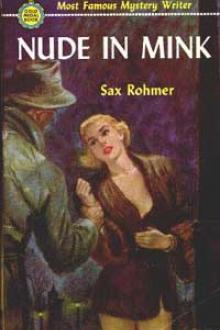Nude in Mink - Sax Rohmer (fun books to read for adults txt) 📗

- Author: Sax Rohmer
- Performer: -
Book online «Nude in Mink - Sax Rohmer (fun books to read for adults txt) 📗». Author Sax Rohmer
Donovan, uneasily, crossed to the lift and was taken up to the third floor.
“Fourth door to the right,” the liftman directed, and Donovan approached this door and rang the bell.
The door was opened almost immediately by a tall, white-haired man, of pale complexion, who wore spectacles.
“Er—is Mr. Sandford…” Donovan glanced again at the number, wondering if he had made a mistake.
The white-haired man laughed loudly and shot out a welcoming hand.
“You give me new confidence, Donovan! Come right in!”
“Maitland!”
Donovan paused, holding the outstretched hand, and staring, amazed. But Maitland pulled him in and closed the door, then began to pace about the small room.
“What has become of my Naval beard, you inquire? Why is my hair white? Why do I wear spectacles? Well, you can’t have forgotten my former interest in amateur theatricals. Here I am, at it again! Sit down.”
“This is simply fantastic!”
“It’s pretty grim, too.”
In his rapid, staccato fashion, Maitland outlined those facts not known to Donovan—and Donovan’s simmering anger gave place to a growing sense of guilt. His passion for Claudette had put him in a false position…
“My standin, or substitute,” Maitland concluded, “who is posing as myself, up in Scotland, has had one very narrow squeak!”
“You mean that Sumuru—”
“Yes. She has swallowed the bait, hook and all! Someone tried to gas him in his own room only last night.”
“Good God!”
Maitland nodded shortly.
“But he’s alive—and so am I—”
The phone buzzed, and Maitland took up the instrument, listened, said, “Thanks. All correct”—and replaced the receiver.
“Scotland Yard reporting you have just arrived!” he explained dryly. “And now, I have a bone to pick with you—”
“I know, Maitland!” Donovan stood up, restless, irresolute. “I feel—”
“My dear fellow, I can guess how you feel. You have seen Claudette, and she has told you that you will never see her again unless you—belong to the murder gang! Am I right?”
“No, Maitland. Even Claudette doesn’t belong to it, yet.”
“Good, Donovan—excellent. For, faced with such wheels within wheels one feels inclined to give the thing up. It’s a new kind of organisation. Heaven knows how high up the social scale it goes. Almost anybody might turn out to be a member. We don’t know friend from foe. It’s staggering.”
“At least we know that Sumuru directs the whole horrible thing.”
“Quite so. But who is she?”
“Furthermore, a Spanish girl, Dolores, poisoned Tristram, for Sumuru told me so “
“She may have told you so,” Maitland snapped irritably. “But that’s not evidence. And in any case, who is Dolores? Where is she? Even if we found her and had her detained, we should find that she could produce a faultless alibi. An ex-Commissioner said recently that there have been many murder cases in which the police have known the criminal but failed to find evidence sufficient to ensure a conviction. The present case is an outstanding example.”
“It is,” Donovan agreed miserably. “If I can get no news of Claudette, I think I shall go mad.”
He found it almost impossible to believe that nearly two weeks had gone by since he had spent those golden moments with Claudette, harder still to accept the fact that all the resources of Scotland Yard and the Secret Service had failed to trace her. No arrest had been made in connection with the deaths of Sir Miles Tristram and Ian Forrester, and, since the coroner’s jury had returned ambiguous verdicts, public interest already had waned.
Maitland stood up and stared out of the window. It offered a prospect of a blank wall.
“I quite understand, Donovan.” Irritation had gone from his voice: he spoke with deep sympathy. “Of course, I know you saw her that day—and no doubt certain inducements (I can guess their nature) were put forward to win your support. In return for some sort of information you had to promise secrecy, I suppose. Well—you can do nothing about that. But I hope sincerely it wasn’t information which I should have.”
Donovan was touched by his manner.
“I give you my word it could be of little use, Maitland. It merely confirmed what you have just been saying—that the thing is a world organisation, that influential people belong to it.”
Maitland nodded.
“You were very sticky with Inspector Ives when he questioned you. I was listening behind the door… Don’t glare! But Ives put two and two together. Too late, he discovered the private exit by means of which Sumuru slipped through our fingers. Oh! I understand! I understand! No one expects a man to sacrifice the woman he loves. There are no reproaches coming, Donovan—although you were taking desperate chances with my life.”
Donovan’s mercurial spirits sank again.
“Maitland—I feel like the lowest insect that crawls. But what could I do? What could I do? If it comes to that, what can any of us do, with an organisation that has members all over the world? Important people, socially and politically. It’s a fearful thing. We have no means of knowing who belongs to it, and who doesn’t.”
“As I have said, the Nazis all over again, Donovan, but this time international—and with a woman Fuehrer! Hitler, in the art of winning disciples, was a child beside Sumuru. She knows every move in the game. She has the brain of a genius, the courage of a tigress. For my peace of mind, tell me one thing:—You have not bound yourself in any way to Claudette—or to those people?”
“In no way. But anything I do against Sumuru will react upon Claudette!”
“Stay out of it, then,” said Maitland shortly. “I am by no means certain that Sumuru is still in London, but there is one line of inquiry from which I hope for some result.”
“What is that?”
Maitland dropped on to the side of the bed and lighted a cheroot.
“The Baroness Rikter, President of the St. Erik Ambulance Corps.”
“But the baroness—”
“Has her headquarters in one of the few houses in London which might contain that amazing apartment where you and I once interviewed Sumuru—”
Donovan experienced sudden excitement.
“The marble room, with the lily pond and the banks of mimosa? The silk curtained recess? The—”
“Just so,” said Maitland quietly. “Lorimer House, the former home of Sir Martin Lorimer, the Victorian painter. The house to which Jean Barlow went … I have been studying the history of the baroness, Donovan. And I find that she nursed the Baron—one of the wealthiest men in Sweden—during his final illness. Their marriage was a death-bed ceremony—a gesture of appreciation.”
“Who was she, before, then?”
“A nursing sister from a well-known Stockholm hospital. We have been unable to learn any more about her.”
“But what are you going to do?”
“That’s where the solicitor business comes in! And that’s what I’ve been waiting for. I am at last empowered by a prominent patron of St. Erik’s to inquire what is to be done with their vast surplus funds. I am taking Detective-sergeant Locker along with me in the capacity of my managing clerk. He is highly observant and intelligent. I have an appointment with the baroness for that purpose, at five o’clock this evening!”
“And I can’t come?”
“And you can’t come!”
2
My Lady sat at her large, workmanlike desk in her small, workmanlike office. She wore nurse’s uniform—silver grey with scarlet facings. A uniform cape was draped over a chair. Philo, standing before her, rested one muscular hand on the back of this chair.
“My Lady?”
“All is ready for our departure, Philo?”
The golden voice was calm, untroubled.
“All is ready, Madonna—and the sooner we depart the better.”
Sumuru’s eyes opened widely for a moment—and Philo’s glance fell.
“That is for me to decide. My orders concerning Dr. Steel Maitland were bungled. Those responsible will report to Paris and await me there.”
“They left this morning, My Lady.”
“He is still in Scotland?”
“According to latest reports, he is.”
Sumuru’s eyes became nearly closed.
“We can never be safe whilst this man remains at large. But all I came to England to do I have done—except that one thing. No, perhaps another. What of the American, Donovan?”
“I have no one to watch his movements, Madonna. And it is impossible for me to perform so many duties at the same time. But he has kept in constant touch with Scotland Yard.”
My Lady began to arrange a number of papers on her desk.
“And how is the little Claudette?”
“She is very unhappy, Madonna. Always, she weeps. Dear My Lady! you take too many risks! This solicitor who is coming here—”
She looked up, sharply.
“Silence, Philo. For such work as mine, I need vast capital. Most of my own I have expended. This man, Sandford, comes to inquire about the disposal of surplus St. Erik funds. I must satisfy him. Then—we shall go.”
“Ah!”
That deep note conveyed otherwise inexpressible relief.
“The golden orfe from the lily pool have been safely forwarded?”
“Yes, My Lady.”
Sumuru smiled.
“Remain out of sight whilst the lawyer is here. Let one of the regular St. Erik’s nurses admit him and show him into the office adjoining the Arab lobby.”
“Yes, My Lady.”
Philo bowed low, and retired …
3
“If you will wait a moment, Mr. Sandford, I will take your card to the baroness.”
Maitland, professionally attired, and carrying rolled umbrella and a black hat, bowed stiffly. He had been cultivating a slow and hesitant style of speech for the role, although the girl, a sturdy and competent looking nursing sister, was too characteristic to merit guile.
“She is expecting me?”
“Yes, I believe so “
“Thank you, nurse “
The girl went out, partly closing the door of this small, cedar-panelled room; and Maitland spoke in a low voice.
“This is like the inside of an Arabian palace. Did you notice those wonderful mushrabiyeh windows?”
Sergeant Locker nodded.
“I believe it’s known as the Arab Court, sir. Were you never here before?”
“Er—” Maitland hesitated—“I’m not sure. But, if so, I have forgotten it.”
“It was in this Court that Sir Martin Lorimer painted his famous picture ‘The Slave Girl,’ I believe. For years the house has been a show place—until St. Erik’s took it over during the late war.”
“Indeed.” Maitland was staring around at the panelled walls. “Do you happen to remember if there is a marble room in Lorimer House?”
Locker frowned thoughtfully.
“Not in the part once open to the public. But I think I have heard that the studio, upstairs, is a reproduction of some Roman villa.”
“H’m—very curious.” Maitland was haunted by evasive memories. “You tell me that you have never met the baroness?”
“No, sir. But I have seen her. An old lady of sixty or so, with silver hair. Carries an ebony stick and leans on it when she walks.”
“I see,” Maitland murmured abstractedly… “Ah! here comes the nurse.”
The girl threw the door open and stood aside.
“Will you please come this way, Mr. Sandford. The baroness will join you in a few moments.”
They followed her across the Arab Court and up a short stair to a small, workmanlike office in which there was a large, workmanlike desk…
“If you don’t mind waiting here.”
They sat down, and again the nurse left them.
“So far, all very businesslike,” Maitland commented. “St. Erik’s run a fleet of ambulances, don’t they?”
“Yes, Dr. Maitland—”
“Damn it! Don’t use that name!”
“Sorry!” Locker flushed guiltily. “A slip on my part. Yes —they got them to most of the battle fronts during the war. But I understand they have all been returning to Sweden recently—hullo!”
They both detected the sound of a tapping stick, approaching…





Comments (0)